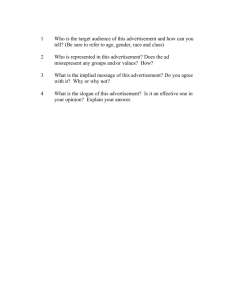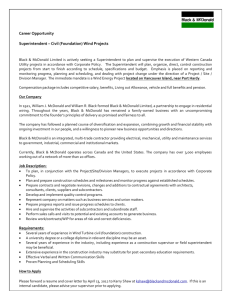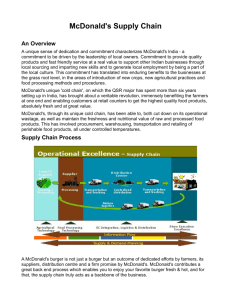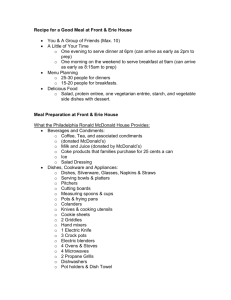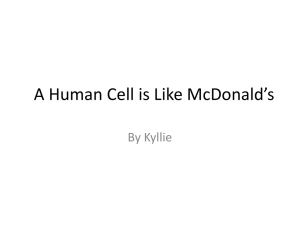qsr initiative for responsible advertising and marketing
advertisement
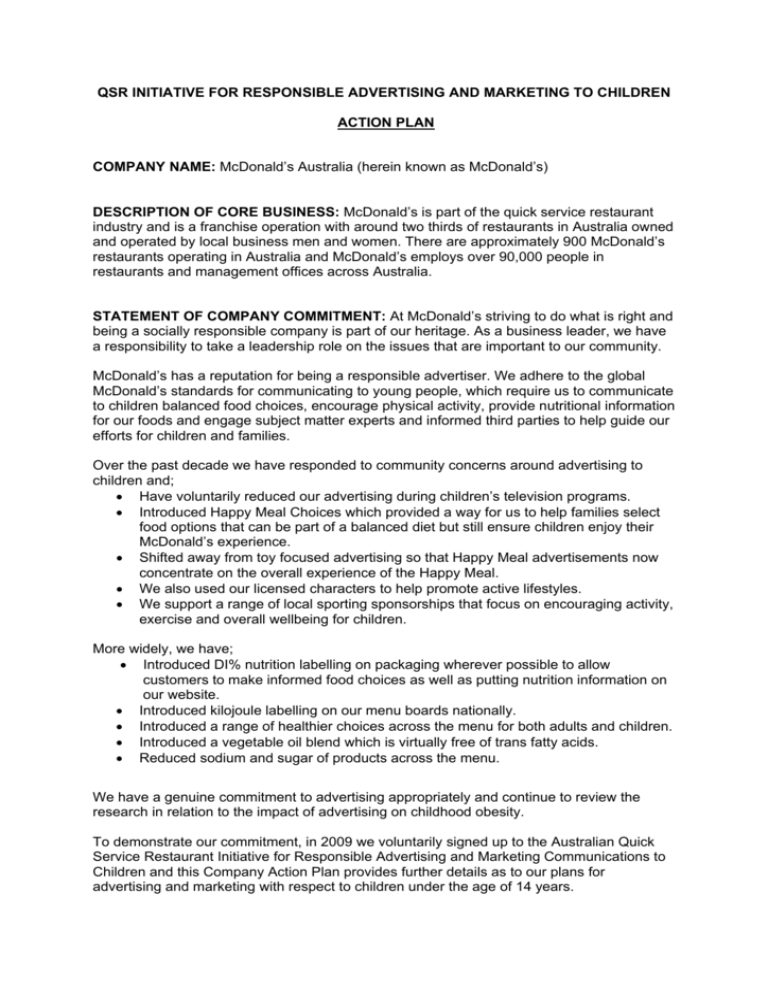
QSR INITIATIVE FOR RESPONSIBLE ADVERTISING AND MARKETING TO CHILDREN ACTION PLAN COMPANY NAME: McDonald’s Australia (herein known as McDonald’s) DESCRIPTION OF CORE BUSINESS: McDonald’s is part of the quick service restaurant industry and is a franchise operation with around two thirds of restaurants in Australia owned and operated by local business men and women. There are approximately 900 McDonald’s restaurants operating in Australia and McDonald’s employs over 90,000 people in restaurants and management offices across Australia. STATEMENT OF COMPANY COMMITMENT: At McDonald’s striving to do what is right and being a socially responsible company is part of our heritage. As a business leader, we have a responsibility to take a leadership role on the issues that are important to our community. McDonald’s has a reputation for being a responsible advertiser. We adhere to the global McDonald’s standards for communicating to young people, which require us to communicate to children balanced food choices, encourage physical activity, provide nutritional information for our foods and engage subject matter experts and informed third parties to help guide our efforts for children and families. Over the past decade we have responded to community concerns around advertising to children and; Have voluntarily reduced our advertising during children’s television programs. Introduced Happy Meal Choices which provided a way for us to help families select food options that can be part of a balanced diet but still ensure children enjoy their McDonald’s experience. Shifted away from toy focused advertising so that Happy Meal advertisements now concentrate on the overall experience of the Happy Meal. We also used our licensed characters to help promote active lifestyles. We support a range of local sporting sponsorships that focus on encouraging activity, exercise and overall wellbeing for children. More widely, we have; Introduced DI% nutrition labelling on packaging wherever possible to allow customers to make informed food choices as well as putting nutrition information on our website. Introduced kilojoule labelling on our menu boards nationally. Introduced a range of healthier choices across the menu for both adults and children. Introduced a vegetable oil blend which is virtually free of trans fatty acids. Reduced sodium and sugar of products across the menu. FOOD We have a genuine commitment to advertising appropriately and continue to review the research in relation to the impact of advertising on childhood obesity. To demonstrate our commitment, in 2009 we voluntarily signed up to the Australian Quick Service Restaurant Initiative for Responsible Advertising and Marketing Communications to Children and this Company Action Plan provides further details as to our plans for advertising and marketing with respect to children under the age of 14 years. CORE PRINCIPLES: We will meet each of the core principles outlined in the Quick Service Restaurant Initiative for Responsible Advertising and Marketing to Children by: Advertising Placement McDonald’s will ensure that any advertising or marketing communications that are placed in a medium that is directed primarily to children (in relation to television this includes all C and P rated programs and G rated programs that are directed primarily to Children where Children represent 50 per cent or more of the audience of the medium), represent healthier choices, as determined by a defined set of Nutrition Criteria for assessing children’s meals. Advertising or Marketing Messages McDonald’s agrees to only advertise or market food and/or beverages to Children less than 14 years if the advertising or marketing communications represents healthier choices, as determined by a defined set of Nutrition Criteria for assessing children’s meals. Popular Personalities and Licensed Characters McDonald’s agrees to only use popular personalities or licensed characters in our advertising and marketing communications for food and/or beverages to Children less than 14 years if the advertising and marketing communications represents healthier choices, as determined by a defined set of Nutrition Criteria for assessing children’s meals. Product Placement McDonald’s will not pay for or actively seek to place food and/or beverage products in the program or editorial content of any Medium directed primarily directed to children less than 14 years unless such food and/or beverage products represent healthier choices, as determined by a defined set of Nutrition Criteria for assessing children’s meals. Use of Products in Interactive Games McDonald’s will ensure that any interactive game primarily directed to children less than 14 years which includes food and/or beverage products, represents healthier choices, as determined by a defined set of Nutrition Criteria for assessing children’s meals. Advertising in Schools McDonald’s does not advertise in schools or conduct marketing activity in schools without prior approval of the school authorities. Such activity is usually related to educational purposes or related to healthy lifestyle or physical activity. Children’s Sporting Events McDonald’s will ensure that any food and/or beverage products or vouchers that are given to Children less than 14 years as awards or prizes at children’s sporting events will represent our healthier options, as determined by a defined set of Nutrition Criteria for assessing children’s meals. Premium Offers McDonald’s commits to not use premium offers in any advertising and marketing communications to children less than 14 years for food and/or beverage unless that advertising or marketing communications represent healthier choices, as determined by a defined set of Nutrition Criteria for assessing children’s meals. On-pack Nutrition Labelling McDonald’s commits to continue to provide nutritional profile information (Daily Intake %) on packaging wherever practical. Availability of Nutrition Information Kilojoule information for all products is displayed on McDonald’s menu boards nationally. In addition, McDonald’s commits to continue to provide nutritional profile information (including ingredients lists, allergens and Daily Intake %) on our website and upon request in our restaurants. NUTRITION CRITERIA: We have worked closely with a team of Accredited Practising Dieticians from The Food Group Australia in consultation with national guidelines and authorities on children’s nutrition to develop a defined set of nutrition criteria for assessing children’s meals. For a meal to be considered a healthier choice, according to Appendix 1 - the nutrition criteria for assessing children’s meals - the meal: Should reflect general principles of healthy eating as defined by credible nutrition authorities; and Must comply with defined criteria for energy (kilojoules), saturated fat, sugar and sodium. Please refer to Appendix 1 available on our website for further details about the nutrition criteria for assessing children’s meals. ADVERTISING AND MARKETING COMMUNICATIONS: McDonald’s will apply these principles to any matter generated by us which is published or broadcast using any Medium for payment or other valuable consideration but does not include in-store point of sale material, labels, or packaging of products. Medium includes television, radio, newspapers, magazines, outdoor billboards and posters, emails, interactive games, cinema and internet sites. COMPLIANCE AND COMPLAINTS: McDonald’s will ensure that the responsibility for compliance with their own guidelines and policies and local regulation is adhered to across the organisation. McDonald’s agrees to abide by any decision or ruling made by the appointed arbiter in relation to the execution of this initiative. REPORTING: McDonald’s will provide a report of all advertising and marketing communications activity against this plan to the Australian Food and Grocery Council for public release on an annual basis.

